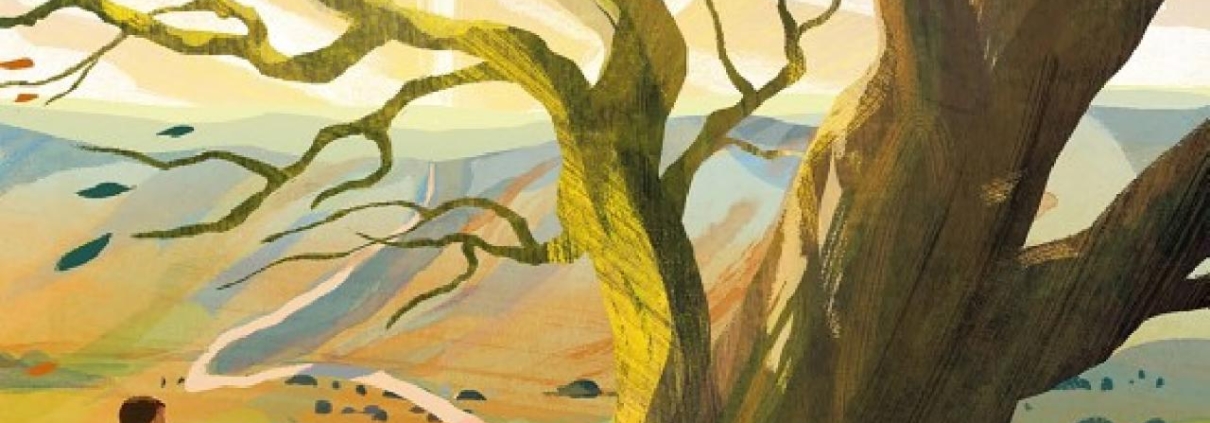Fault Lines and the Triumph of Tenacity: An Interview with Nora Shalaway Carpenter
The world of kidlit is a beautiful, many-faceted place, filled with beauty both whimsical and dark. Few authors can inhabit all areas of that beautiful world like Nora Shalaway Carpenter. A graduate of VCFA’s Writing For Children and Young Adults Program, proud Appalachian author, and a multiple-time graduate assistant, Nora’s work spans many genres and age groups. Her titles include her picture book Yoga Frog, two short fiction anthologies, Rural Voices and (AB)solutely NORMAL, both of which she edited and contributed to, and two acclaimed young adult novels, The Edge of Anything and Fault Lines, the latter of which was published in September, 2023. In this interview, the award-winning author and alum gets real about her experiences both in and out of the program, what motivates her as an author and activist, and her latest young adult gem, Fault Lines! So grab a virtual coffee, and join us!
1.Can you tell us a little about yourself and your most recent YA novel, Fault Lines?
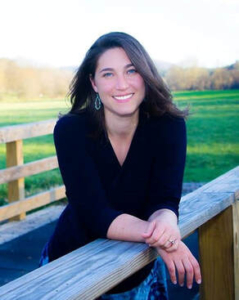 I grew up in rural West Virginia and went to undergrad thinking I was going to be an English literature professor who wrote creatively on the side. That still makes me laugh, thinking I’d have so much free time as a professor. Anyway, to make a very long and roundabout story shorter, while pursuing an MA in English literature, I finally admitted that what I really wanted–what I’d always secretly wanted–was for creative writing to be my main focus. I started attending writing conferences, discovered a love for YA fiction, and after my day job, I’d work on a novel. I’d only ever written really short creative pieces before, so when I proved to myself that I could do it—I could write an entire book—I decided that I was going to learn to do it well. That led to my applying to VCFA (shout out to my fellow Summer 2012 Secret Gardeners!). Since graduating, I’ve become a published author, a writing instructor, and a parent of three kids, the first of whom was born two months before my VCFA graduation! I’m a passionate advocate for normalizing mental health care, debunking the stereotypes surrounding rural people, and protecting the earth.
I grew up in rural West Virginia and went to undergrad thinking I was going to be an English literature professor who wrote creatively on the side. That still makes me laugh, thinking I’d have so much free time as a professor. Anyway, to make a very long and roundabout story shorter, while pursuing an MA in English literature, I finally admitted that what I really wanted–what I’d always secretly wanted–was for creative writing to be my main focus. I started attending writing conferences, discovered a love for YA fiction, and after my day job, I’d work on a novel. I’d only ever written really short creative pieces before, so when I proved to myself that I could do it—I could write an entire book—I decided that I was going to learn to do it well. That led to my applying to VCFA (shout out to my fellow Summer 2012 Secret Gardeners!). Since graduating, I’ve become a published author, a writing instructor, and a parent of three kids, the first of whom was born two months before my VCFA graduation! I’m a passionate advocate for normalizing mental health care, debunking the stereotypes surrounding rural people, and protecting the earth.
Fault Lines tells the intertwined story of two rural teens—one with a secret energetic connection to the earth, suffering immensely from damage caused by fracking—and the other depending on fracking completely, his mother’s pipelining job being the only thing keeping them off the street. The book takes place in rural West Virginia, where I grew up. West Virginia and its people are rarely seen in YA literature, though often ridiculed and maligned in popular media.
- Mental health is a recurring theme in your works, including the anthology AB(solutely) NORMAL and in your YA debut The Edge of Anything. How is mental health explored in Fault Lines as opposed to the other works, and what conversations or increased awareness do you hope the novel sparks?
Mental health isn’t a main theme in Fault Lines, but it nonetheless shapes the experience and worldview of Dex, one of the two point-of-view characters. I don’t want to spoil the book, but suffice it to say that Dex doesn’t realize this until close to the end of the novel. There are certainly conversations to be had about how the mental health of those close to us informs our identities, but I suspect (and hope!) Fault Lines will also inspire readers to examine their assumptions about rural people. Even more importantly, given the state of the world, I hope readers consider how real solutions to complex world problems are only possible if we humanize people who believe differently than us, consider why they might feel as they do, and work together respectfully to create new policy and innovative ways of living and doing. As I explain in my author’s note: “We are allowed to care about many things simultaneously and to fight fiercely for them, even if they, at first glance, seem utterly at odds with one another and maybe even the people we love.”
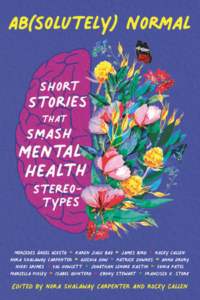
- Fault Lines and your anthology AB(solutely) NORMAL were both named to the prestigious TAYSHAS state reading list by the Texas Library Association. How does it feel to have your work recognized in such a way, especially in a state currently banning other books?
Gosh, I am incredibly honored and grateful that librarians gave these books such recognition. Of course the Texas librarians are not the people banning books. Instead, they are on the front lines of the fight, working tirelessly to combat the minority threatening to take away readers’ essential freedoms.
- As an Appalachian author, you’ve worked hard to combat stereotypes about rural people and to write authentic rural characters. Can you tell us why this is a driving force in your writing?
This one’s pretty simple: I’ve internalized, rejected, and combatted those stereotypes my entire life. I’ve code switched and hidden my rural roots in certain situations to be afforded more respect, and I’ve been demeaned for nothing more than where I call home. I am accustomed to being overlooked, undervalued, and having to fight for any space at numerous tables. But rural tenacity is a real thing. I know my rural truth, and I know it’s not reflected in most popular media. I will forever work to change that.
- Serving as faculty for the Highlights Foundation’s Whole Novel Workshop and Intro to Short Fiction class, what aspects of teaching do you find most rewarding, and how does it influence your own writing?
I love encouraging and uplifting writers so that they find their confidence. That’s what I needed most as an aspiring writer. Even if there’s a lot of craft work to do, craft is learnable, and I enjoy teaching students craft ideas that took me a lot of trial and error to figure out. Confidence is a trickier thing. In fourth grade I had to do a research project on Calvin Coolidge, and this quote has stuck with me: “Nothing in this world can take the place of persistence. Talent will not; nothing is more common than unsuccessful men with talent. Genius will not; unrewarded genius is almost a proverb. Education will not; the world is full of educated derelicts. Persistence and determination alone are omnipotent.” This is true in so many aspects of life, and writing is no exception. There are loads of talented, smart writers out there. To become a traditionally published author, you must keep going.
It is easy to give up. It is easy to believe you could have written a great book if you’d tried but protect yourself from the possibility of failure by never doing the work. “Failure” is necessary. “Failure” is how writers grow (and how characters grow!), and you will not last long in this business if you cannot persist in the face of adversity. This is the hardest part of being a writer, I think, and it’s not something you magically learn overnight and never have to worry about again. Every author I know (myself included) has writer friends who feed their confidence in moments of self-doubt and rejection. Every writer and aspiring writer willing to do the work has within them the potential to produce extraordinary stories. They just need someone to help them see that possibility. I am honored to be one of those champions for my students. The VCFA faculty members have been so supportive of me, and I strive to emulate their example.
In regards to how teaching influences my own works, I find it impossible to ask writers to challenge themselves and then not want to challenge myself, too. Plus, when you see what’s not working in someone’s else writing, you notice places that you struggle with that same issue. And every time I craft a lecture or workshop, it allows me to study craft issues that strengthen my own work, too.
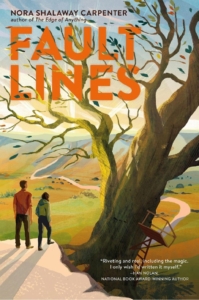
- You have an MFA from Vermont College of Fine Arts and have come back more than once as a GA. How has your time at VCFA shaped your craft?
When I started VCFA, I was mostly a self-taught creative writer. Compared to students who had degrees in creative writing or even published books already, I knew next to nothing about actual craft. The first residency lectures blew my mind wide open. Then my first advisor, Coe Booth, gifted me much-needed permission: I didn’t need to write to impress (hello, recovering perfectionist here!). I needed to write to tell a good story, and that involved allowing myself to produce a sh*tty first draft. I wish I could say I learned that lesson immediately, but as I told my fourth advisor, Uma Krishnaswami, after graduating with my MFA, I finally felt ready to begin it! I still love taking workshops and classes from other authors. Everyone has something to teach, and I am always constantly learning.
As for GAing, my second and third semesters were, unfortunately, filled with personal tragedy and a mental health crisis, much of which I hid from friends and classmates. I wish now I hadn’t done that because I cut myself off from support, but hindsight, you know? (See author’s note in The Edge of Anything.)
Serving as a GA allowed me to experience some social aspects of the program that I’d missed while also learning from new faculty members. My fellow GAs came to be some of my closest and most supportive writing friends. And so many of my beloved (and mega talented!) Secret Gardeners continue to help me with craft by reading drafts, answering questions, and publishing incredible books that teach me so much.
Writing is so much about community. I’ll forever be grateful to VCFA for helping me establish mine.
- With such a diverse range of works, from novels to anthologies, what genre or theme do you find most fulfilling to explore as a writer, and are there any upcoming projects you’re particularly excited about?
All of them! What I mean is, I cannot do a project justice if it doesn’t excite me, and honestly, I find limiting myself to a particular genre creatively stifling. How am I supposed to grow as a writer and person if I do that? For that reason, I’m particularly stoked to be contributing poetry about life with chronic migraines and OCD to a forthcoming anthology for adult readers featuring Appalachians with disabilities, edited by Read Appalachia founder Kendra Winchester. I’m midway through co-writing a contemporary middle grade with my agent mate Chris Barton, and I’m currently finishing up edits on my third anthology. Look for the announcement any day! It feels very rural of me, actually, to refuse to be contained within one specific box.
I’m also finding joy in revisiting my academic roots. I’m continuing to partner with Literacy in Place and rural scholar Dr. Chea Parton, most recently in an interview about rurality in literature with YA scholar Steve Bickmore, founder of The Summit on the Research and Teaching of YA Literature. If you haven’t checked out this virtual conference, you definitely should! It’s a great place to see how your critical papers can be used in your career (and to find sources for your critical stuff!). Chea and I are also presenting together, along with author Michael Thomas Ford at the 2024 Appalachian Studies Association conference.
The aforementioned are opportunities that came about because of, shall we say, my rural-instilled scrappiness. My debut The Edge of Anything released March 24, 2020, literally days after COVID shut down most of the world. With all my events cancelled, I scoured for virtual opportunities. That’s how I found The Summit. I submitted a proposal, was accepted, then gave a presentation that led to some incredible friendships and professional connections. Not every writer is going to enjoy public stuff like this, but I love collaborations that evolve from mutual respect and excitement. Life, after all, is all about authentic connections (and not just between people!) and the interconnectedness of all things, which is probably the theme I explore most in my writing. 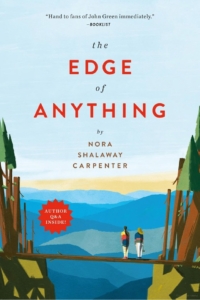
- What is the most valuable piece of advice you can give about writing?
Write what excites you. Write a story that you want to read. You cannot control most things in this highly subjective business, but you can control whether or not you write a story you’re proud of, one that matters to you.
To do that, take as many classes as you can, and find other writers you connect with on a personal level. You might have to step outside your comfort zone to do that—attending author events, craft seminars, or a program like VCFA. And if you want to be a writer, you must write. It doesn’t have to be every day, or for very long each time, but it does need to happen. If you write only a page a day every other day, squeezing it between other work and/or care taker obligations, you’ll produce a 365-page book in two years. (P.S. it’s amazing how much writing time you’ll have if you limit social media.) And chances are, you’ll get so excited about the project, you’ll finish way before that.
Above all, write to the end so that you have an entire piece to revise. And keep persisting!
You can learn more about Nora at norashalawaycarpenter.com

